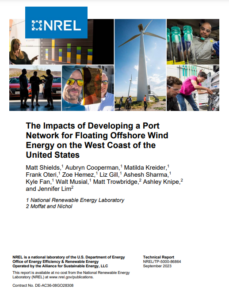Full Title: The Impacts of Developing a Port Network for Floating Offshore Wind Energy on the West Coast of the United States
Author(s): Matt Shields, Aubryn Cooperman, Matilda Kreider, Frank Oteri, Zoe Hemez, Liz Gill, Ashesh Sharma, Kyle Fan, Walt Musial, Matt Trowbridge, Ashley Knipe, and Jennifer Lim
Publisher(s): National Renewable Energy Laboratory
Publication Date: September 30, 2023
Full Text: Download Resource
Description (excerpt):
“Developing a system of ports that can enable commercial-scale floating offshore wind energy development on the West Coast of the United States will require significant investment and coordination between governments, industry, port authorities, and local communities. A critical first step to strategically planning these resources is understanding the number of ports (and associated investment) that would be required to support different phases of offshore wind energy project development, including manufacturing, installation, and operation. But simply tallying up these costs is not sufficient to understand how a robust network of ports could impact local communities, the environment, workforce development, the offshore wind industry, and the West Coast region as a whole. Decision-makers should consider a broader set of information about these potential effects to understand how strategic investments could enable the most beneficial outcomes of a West Coast floating offshore wind energy port network.
In this report, the authors present analyses and perspectives related to port development in California, Oregon, and Washington. We describe the requirements for ports to support floating offshore wind manufacturing, installation, and/or service activities, and estimate the investment and time frames required to construct these ports at suitable locations in West Coast states. We develop indicators for the vulnerability and workforce accessibility of coastal communities and consider the potential risks and benefits associated with port development in these locations. We model how the proximity of an offshore wind project to installation and operations ports can impact the levelized cost of energy of the project, and then consider how these costs could be affected by local versus foreign supply chains. We build on these analyses by developing scenarios with increasing levels of offshore wind deployment and port assets on the West Coast and show how these ports could help achieve deployment goals. Finally, we draw upon outreach with key floating offshore wind stakeholders to summarize five key challenges that will need to be overcome to develop a comprehensive port network, and present potential approaches that could help address these obstacles.
Although there are challenges to building the port infrastructure that can enable commercial scale U.S. floating offshore wind deployment, there is currently an opportunity for the West Coast to develop solutions that could set an example for the entire global industry. A coordinated approach to building a comprehensive network of ports that facilitates strategic planning and collaboration between California, Oregon, and Washington could create resilient, cost-effective, equitable, and impactful infrastructure on the West Coast. Further work will be required to develop these approaches, conduct detailed design studies, and convene key stakeholders and decision makers. While there is a clear urgency to implement strategic plans to meet state and federal offshore wind deployment targets, the West Coast floating offshore wind energy sector has the opportunity to set itself up for long-term success by strategically and collaboratively establishing a clear vision for enabling port infrastructure.”
